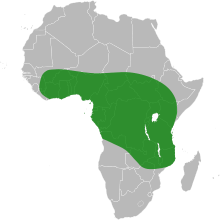Oryza barthii
| Oryza barthii | |
|---|---|
| Scientific classification | |
| Kingdom: | Plantae |
| (unranked): | Angiosperms |
| (unranked): | Monocots |
| (unranked): | Commelinids |
| Order: | Poales |
| Family: | Poaceae |
| Genus: | Oryza |
| Species: | O. barthii |
| Binomial name | |
| Oryza barthii A.Chev. | |
 | |
| The range of Oryza barthii. | |
| Synonyms[1] | |
| |
Oryza barthii, also called Barth's rice,[2] wild rice,[3] or African wild rice,[4] is a grass in the rice genus Oryza. It is an annual, erect to semierect grass. It has leaves with a short ligule (<13 mm), and panicles that are compact to open, rarely having secondary branching. The inflorescence structure are large spikelets, 7.7-12.3 mm long and 2.3-3.5 mm wide, with strong awns (up to 20 cm long), usually red. The inflorescences have anthers 1.5–3 mm long.
This wild rice grows in sub-Saharan Africa, and is found in mopane or savanna woodland, savanna or fadama. O. barthii grows in deep water, seasonally flooded land, stagnant water, and slowly flowing water or pools; it prefers clay or black cotton soils, and is found in open habitats.[5] It is the progenitor of cultivated Oryza glaberrima, African rice.[6]
Recently, the genome of O. barthii was sequenced.[7]
References
- ↑ "The Plant List: A Working List of All Plant Species".
- ↑ "Oryza barthii". Natural Resources Conservation Service PLANTS Database. USDA. Retrieved 25 July 2015.
- ↑ "USDA GRIN Taxonomy".
- ↑ "NCBI Taxonomy".
- ↑ Rice Knowledge Bank, Wild Rice Taxonomic information, accessed 12.18.2007. Archived March 13, 2007, at the Wayback Machine.
- ↑ Linares 2002, African rice (Oryza glaberrima): History and future potential PNAS 99:16360-16365.
- ↑ Zhang, QJ.; Zhu, T.; Xia, EH.; Shi, C.; Liu, YL.; Zhang, Y.; Liu, Y.; Jiang, WK.; et al. (Nov 2014). "Rapid diversification of five Oryza AA genomes associated with rice adaptation". Proc Natl Acad Sci U S A. 111 (46): E4954–E4962. doi:10.1073/pnas.1418307111. PMID 25368197.